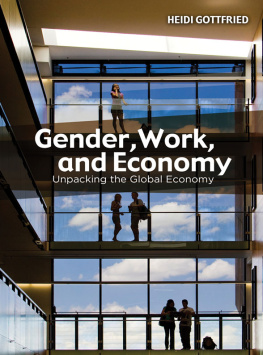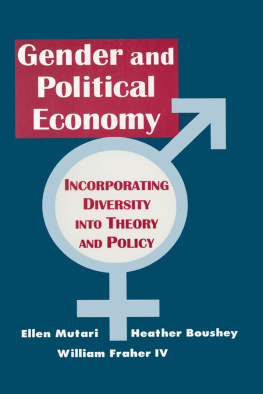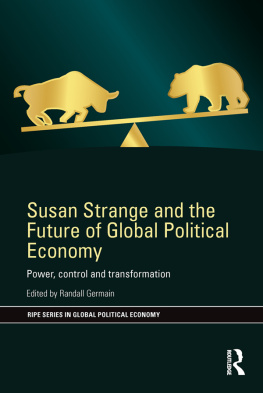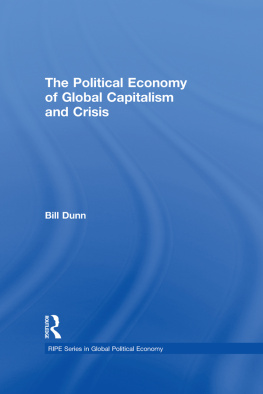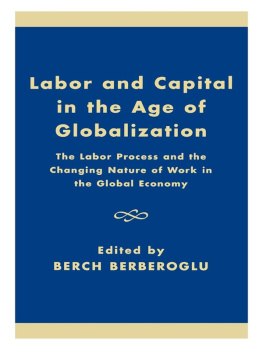Gender, Work, and Economy
Gender, Work, and Economy
Unpacking the Global Economy
Heidi Gottfried
polity
Copyright Heidi Gottfried 2013
The right of Heidi Gottfried to be identified as Author of this Work has been asserted in accordance with the UK Copyright, Designs and Patents Act 1988.
First published in 2013 by Polity Press
Polity Press
65 Bridge Street
Cambridge CB2 1UR, UK
Polity Press
350 Main Street
Malden, MA 02148, USA
All rights reserved. Except for the quotation of short passages for the purpose of criticism and review, no part of this publication may be reproduced, stored in a retrieval system, or transmitted, in any form or by any means, electronic, mechanical, photocopying, recording or otherwise, without the prior permission of the publisher.
ISBN: 978-0-7456-6458-3
A catalogue record for this book is available from the British Library.
The publisher has used its best endeavours to ensure that the URLs for external websites referred to in this book are correct and active at the time of going to press. However, the publisher has no responsibility for the websites and can make no guarantee that a site will remain live or that the content is or will remain appropriate.
Every effort has been made to trace all copyright holders, but if any have been inadvertently overlooked the publisher will be pleased to include any necessary credits in any subsequent reprint or edition.
For further information on Polity, visit our website: www.politybooks.com
Figures
Tables
Acknowledgments
Any book is both a solitary pursuit and a collective effort. In this respect, this book represents the cumulative knowledge gained from conversations with colleagues over the years and the expert advice and encouragement from Politys editorial and production staff. A chance communication from Emma Longstaff launched the book project. Her query regarding the Economy and Society series tweaked my interest in writing a book on gender and the economy. One year into the financial crisis, the book on the global economy seemed even more relevant. Nonetheless, crafting a narrative requires more than a little nudging. I cannot imagine the book coming to fruition without Jonathan Skerretts encouragement. Throughout the publication process, Jonathan was a one-man rooting section. Authors rely on a good copy-editor whose deft linguistic abilities can turn a tortured sentence into beautiful prose. For this I must thank Leigh Mueller. She always made suggestions for changes without even a hint of a thought bubble inquiring whether I was a native English speaker. Toward the end of the process, Clare Ansell shepherded the book to its publication. Finally, the book benefitted enormously from the detailed comments by two anonymous reviewers and Leslie Salzinger.
Many colleagues influenced my thinking on the issues of relevance to the current era. From its earliest incarnation as a small feminist group meeting at Bochum University, GLOW members have developed a shared body of knowledge on gender, globalization, and work transformation. Though we never realized our original collective fantasy to meet in Bellagio, we discussed and debated our work in the tropical heat of Tokyo, the pastoral retreat of Lowwood, the luxurious landscapes of Monets Provence, along with many other places in the US and Europe. My ideas have been shaped by conversations with members and others invited to our workshops, including: Joan Acker, Sylvia Walby, Karin Gottschall, Karen Shire, Ilse Lenz, Mari Osawa, Diane Perrons, Ursula Mueller, Judith Lorber, Ann Orloff, Margarita Abe-Estevez, Myra Marx-Ferree, Keiko Aiba, Kazuko Tanaka, Sawako Shirehase, Makiko Nishikawa, Yuko Ogasawara, Jenny Tomlinson, Susan Durbin, Ursula Holtgrewe, Glenda Roberts, Allison Woodward, Monika Goldmann, Christine Bose, Ulrike Liebert, Sarah Swider, Leah Vosko, and Anne Witz. Frequent visits to Japan gave me a perspective on the importance of gender in explaining the causes and consequences of economic crisis. I want to thank Mariko Adachi, Ruri Ito, and Kaoru Tachi, my hosts at Ochanomizu University, where I spent my sabbatical in 2007.
Convention typically leaves our loved ones place of honor at the end, even though their imprint is there from the beginning. Early on, Bernhard has taught me to observe the world around me and to open myself to new experiences. The book draws on anecdotes derived from the challenges of motherhood. My choice of the word challenge is a way to situate our personal biography in a larger context. However, I apologize to my son if my rapid-fire questioning feels too much like an interrogation, something of an occupational hazard. In the end, I hope that my moral judgment over what to include balances my search for truth with respect for his privacy. Also implicated is my partner of more than three decades. I have lost count of the many versions that he kindly and carefully read. Even though he bloodied the text with his red pen, he offered his criticism in the spirit of comradeship. David Fasenfest kept me on track when my utter frustration threatened to derail the completion of the project. This book is dedicated to them, to their compassion toward others and to their commitment to making the world a better place.
CHAPTER
An Introduction to Gender, Work, and Economy: Unpacking the Global Economy
R ECENTLY , the near economic cataclysm resulting from the financial meltdown exposed hidden fault-lines in the global economy. Lehman Brothers was not the only casualty on that fateful day of September 15, 2008. Soon after, a suit brought by two female ex-vice presidents against the former head of the derivatives unit of AIG raised the specter that the boys club culture ignored the impact of risk-taking on womens careers and on working-class communities at large. In this specific case, the boss allegedly admitted his preference for young (female) workers with curb appeal to those who look like his aunt (Gallu and Son 2010: 1). Such sentiments, usually left unsaid, express a structural condition valorizing beauty over brains, profits over peoples lives and livelihoods. The usual narrative of the financial crisis glosses over the possibility that such corporate leaders hyper-masculine bravado may have contributed to irrational exuberance born out of their neglect of social responsibility for others. Behind the scenes, their abstract financial investment calculations, and hubris rooted in the expression of hegemonic masculine domination over nature, fostered a culture of undue risk-taking, bringing global capitalism to the precipice. Crises such as this allow a glimpse into both the intricacies of global economic processes and the usually shrouded worlds of work.
Another remnant left in the wake of the crisis has been dubbed The Great He-cession (Salem cited in the New York Times 2009). Relatively new in this recession, more men than women lost their jobs and experienced long bouts of unemployment. Between 2007 and 2009, the economy shed manufacturing and construction jobs, once the primary engines of muscular economic growth and the underpinning of working-class masculinity and the strong male breadwinner family model. This idea of the he-cession describes a process of economic restructuring already underway. Less clear is what drives the shift from industrial production to service-dominated economies.

